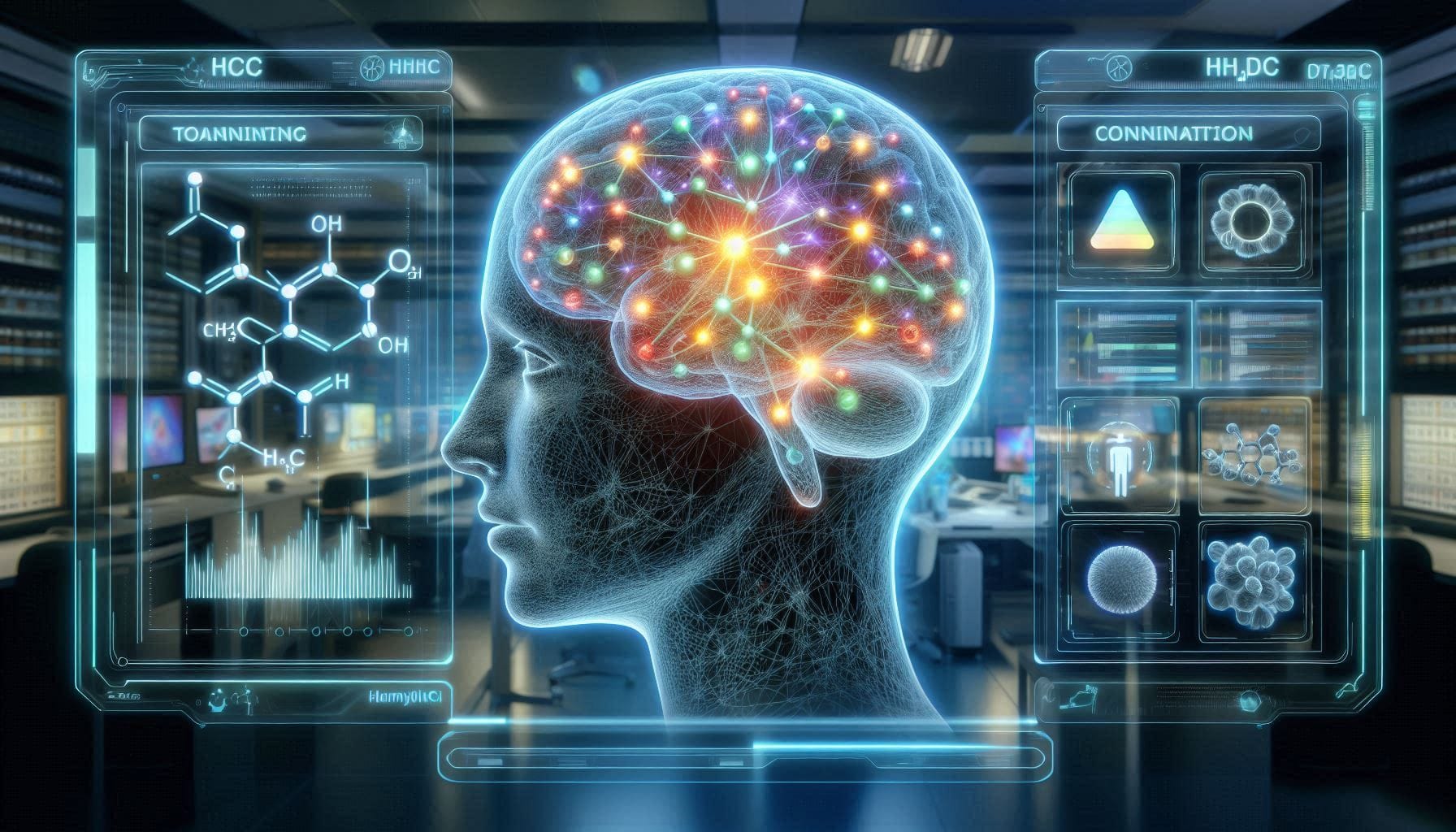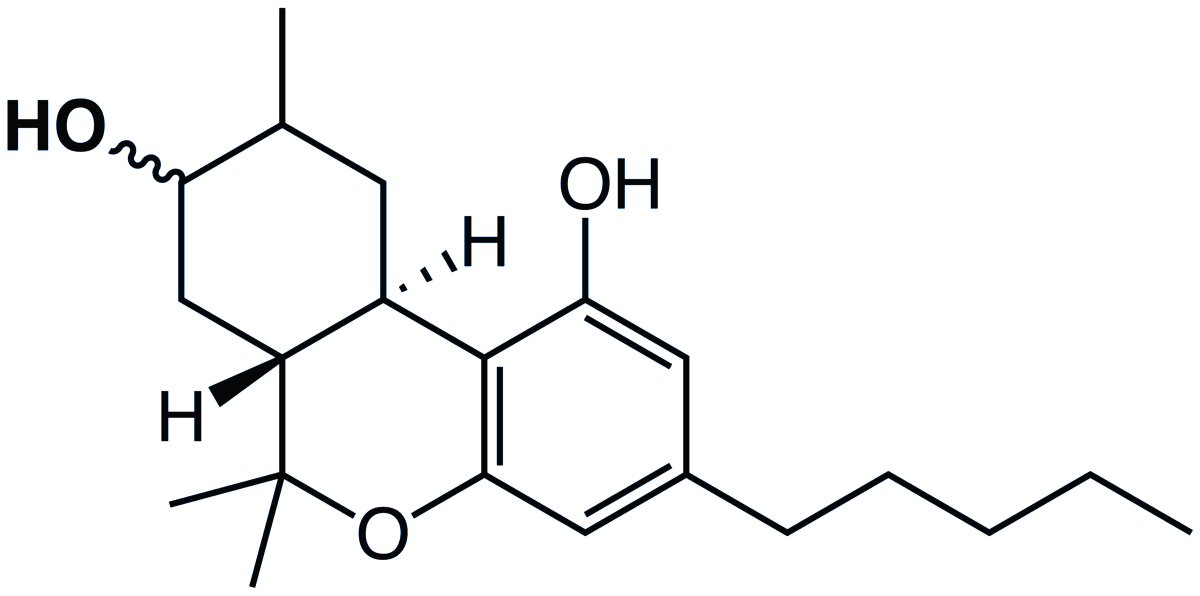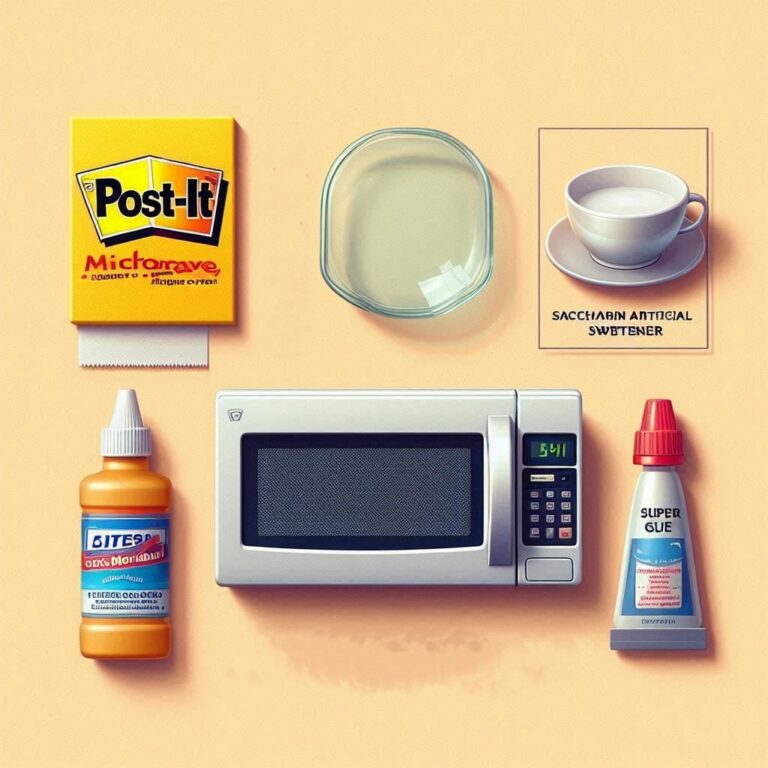🚀 Hook: What If Your Mood Could Be Controlled Like a Smart Home?
Imagine this: You wake up feeling sluggish and unfocused, but instead of battling through the fog, you flip a switch in your brain—and within moments, your mood shifts. Suddenly, you’re relaxed, energized, or even motivated to take on the day.
No, this isn’t science fiction. This is the emerging reality of synthetic cannabinoids, like HHC (Hexahydrocannabinol), which have the potential to control not just your body, but your mind as well.
Synthetic cannabinoids like HHC are designed to mimic the effects of naturally occurring compounds found in cannabis, but with enhanced precision and control. Much like how smart homes can adjust temperature, lighting, and music to fit your preferences, Hexahydrocannabinol could one day allow you to fine-tune your emotional and mental state with the push of a button.

What does this mean for us? We’re on the verge of a future where altering our mood, improving focus, or even accessing a state of relaxation might be as easy as adjusting the settings on an app.
Curious about Hexahydrocannabinol? Learn what is HHC, how it compares in the debate of HHC vs THC, and get answers to the big question: is HHC safe?
Get ready to explore how synthetic cannabinoids like HHC are paving the way for this brave new world of brain mood control.
🧬 What is HHC? The Science Behind Hexahydrocannabinol
Hexahydrocannabinol (HHC), an emerging synthetic cannabinoid, is rapidly gaining attention and raising questions about its potential and safety. But What Is HCC?
The Chemical Structure of HHC
HHC is a chemically hydrogenated derivative of THC, the primary psychoactive ingredient found in cannabis. While THC has a double bond in its structure, HHC undergoes a chemical modification that adds hydrogen atoms, turning that double bond into a single one. This seemingly simple modification makes HHC more stable than THC, which allows it to resist degradation and improves its shelf-life.
The chemical structure of HHC is similar to that of THC, but the hydrogenation process changes how it interacts with the body. This alteration can impact the potency, effects, and duration of HHC compared to traditional THC.

The Cannabinoid Family Tree
Like THC, HHC is part of the cannabinoid family, a group of compounds found in cannabis plants that interact with the body’s endocannabinoid system. However, while THC is well-known for its psychoactive effects, HHC is thought to be less potent, producing similar effects without the intense “high.”
Is HHC Legal?
The legality of HHC is still a grey area in many parts of the world, especially in the United States. While THC remains federally illegal in many regions, HHC often falls into a loophole due to its synthetic nature. In many states, HHC is not explicitly regulated, making it easier to sell and distribute in areas where THC remains prohibited. However, as with many emerging substances, HHC’s legality can vary depending on local regulations and ongoing legislative changes.
🧠 HHC vs THC: What Makes It Different?
When comparing HHC (Hexahydrocannabinol) to THC (Tetrahydrocannabinol), it’s essential to understand how these two cannabinoids differ in terms of potency, effects, and duration.
Potency, Effects, and Duration
While both HHC and THC interact with the endocannabinoid system (ECS), HHC is generally considered less potent than THC. Many users report that HHC offers a milder and more clear-headed high, while THC is known for its more intense, sometimes overwhelming psychoactive effects.
In terms of duration, HHC’s effects are often reported to last longer than THC’s, with some users noting that the high can persist for several hours. THC, on the other hand, is typically felt in shorter bursts and can peak quickly.
User Reports vs. Lab Data
User experiences with Hexahydrocannabinol tend to describe a subtle euphoria with feelings of relaxation, much like Tetrahydrocannabinol, but without the same level of mind-altering effects. In contrast, THC is known for producing more pronounced euphoria, increased creativity, or, for some, heightened anxiety.
While lab data on HHC is still emerging, early studies suggest that HHC might also produce less cognitive impairment compared to THC. This could make it more attractive for individuals seeking a mild, functional high. However, as with all cannabinoids, effects are highly individual, and some people might experience unexpected side effects.
Medical vs. Recreational Use
THC has a well-established reputation in medical marijuana for its pain-relieving, appetite-stimulating, and anti-nausea properties. HHC, while not as widely researched, is believed to offer some of the pain relief and anti-inflammatory benefits of THC but with fewer psychoactive side effects.
For recreational users, Hexahydrocannabinol might offer a lighter, less intense experience, making it appealing for those who want the benefits of cannabis without feeling too high. THC remains the go-to choice for those seeking a more profound psychoactive effect.
Safer or Sketchier?
In terms of safety, HHC may have an edge due to its hydrogenated structure, which might make it more stable than THC and less likely to degrade into unwanted byproducts. However, given the limited clinical research on HHC, its long-term effects and potential risks remain less understood. Until more studies are conducted, both cannabinoids should be used with caution, and users should stay informed about the potential risks and benefits of each.
🧪 Could Hexahydrocannabinol Be the First ‘Mood API’ for the Brain?
Imagine if you could program your brain like a smartphone app. Now, picture a future where HHC and other synthetic cannabinoids become part of this reality. This could represent a paradigm shift in how we approach mood regulation and mental health—a true “Mood API” for the brain.
Programmable Cannabinoids
What if you could dial in the perfect mood by simply adjusting the cannabinoid blend that interacts with your brain? Hexahydrocannabinol could be a pioneering compound in this new world of programmable mental states, where neurotechnology and cannabinoids work together to create personalized emotional experiences. Instead of traditional therapy, wearable neurotech could connect to a brain-computer interface (BCI), letting you choose your mood on demand.
Combining HHC with Wearable Neurotech
By combining HHC with advanced neurotech like EEGs (electroencephalograms) and BCIs, we could develop tools that allow users to adjust their emotional states. Imagine using a smart patch or wearable device that administers the right amount of Hexahydrocannabinol or other designer cannabinoids, precisely when needed, tailored to your mood map. For example, a stressful moment might trigger a “calm down” protocol, releasing a controlled dose of HHC to ease anxiety and help you focus.
AI-Guided Cannabinoid Blends
In this futuristic world, AI-guided cannabinoid blends could act as personalized mood enhancers, constantly adjusting to your mental and emotional state. With the help of artificial intelligence, these blends could be formulated to improve focus, boost happiness, or even alleviate depression, based on real-time emotional feedback from your brain activity.
Personalized “Neurotuning Kits”
In this speculative future, “neurotuning kits” might be available for delivery right to your door. These kits could include wearable devices, HHC-infused patches, and AI apps that analyze your mood and provide personalized, customized cannabinoid formulas to adjust your mental state. No more waiting for therapists or relying on conventional medications—mood tuning could be as easy as pressing a button.
🧘 The Promise and Risk: Mental Health, Therapy, and Cognitive Freedom
As synthetic cannabinoids like Hexahydrocannabinol gain popularity, there’s growing excitement around their potential to revolutionize mental health treatment. Could HHC be the next breakthrough in treating conditions like PTSD, anxiety, or insomnia? The promise is undeniable, but the risks are equally significant.
Potential Use Cases: PTSD, Anxiety, Insomnia
Hexahydrocannabinol has shown promise in providing anxiety relief and offering users a milder high than THC, making it an appealing option for those seeking mental relief without the intense euphoria. Clinical studies and user reports suggest that HHC might help reduce stress, calm the mind, and provide a sense of well-being, making it a potential treatment for PTSD or other trauma-related disorders.
For individuals battling insomnia, HHC could also offer a new avenue of relief, potentially improving sleep without the morning grogginess often associated with conventional sleep aids. The ability to tap into cannabinoids like HHC for mental wellness could enable more personalized, targeted therapies.
Ethical Risks: Emotional Dependency, Identity Shifts
While the benefits are promising, there are ethical concerns that must be addressed. The potential for emotional dependency is a significant risk. Relying on a substance to regulate emotions could create a situation where individuals might begin to depend on HHC for their emotional stability, bypassing essential coping strategies. Furthermore, there is the danger of identity shifts—altering one’s mental state too frequently might lead to a disconnect from one’s authentic self, raising questions about the long-term consequences of using such substances as regular mood stabilizers.
Unregulated Compounds and Long-Term Risks
Hexahydrocannabinol currently exists in a legal gray area, with minimal regulation and limited long-term scientific data to assess its safety or health impacts. Without clinical trials and FDA approval, there’s no way to guarantee that HHC will be entirely safe for long-term use. As with any new compound, its safety profile needs extensive scientific scrutiny to ensure that it won’t lead to unintended side effects, addiction, or irreversible cognitive changes. The lack of regulation in the market also means there is a wide range of product quality, making it even more important to approach with caution.
⚖️ HHC in the Wild: Current Availability, Safety, and What to Watch Out For
As HHC becomes more popular, it’s important for consumers to be informed about its availability, safety, and what to be mindful of when purchasing or using it.
Market Availability: Vapes, Gummies, and More
HHC products are increasingly available in various forms, including vapes, gummies, and tinctures. The widespread availability of HHC-infused products makes it tempting to try, but it’s crucial to note that these products are not regulated by the FDA. While they are marketed as a legal alternative to THC, the quality and potency of products vary widely across the market. It’s essential to research and buy from trusted brands that prioritize transparency.
Product Quality Concerns
Due to the absence of consistent regulation and oversight from the FDA, the quality of HHC products can fluctuate widely. Consumers need to be aware that the purity of HHC, as well as the presence of other potentially harmful additives, may not always be guaranteed. Some products could contain residual solvents or contaminants, making it crucial to read labels carefully and choose companies that provide third-party lab testing results.
What Consumers Should Know: No FDA Oversight
As of now, HHC products are not subject to the same regulatory standards as pharmaceutical drugs, which means that consumers have limited protection. Without FDA oversight, there’s no guarantee that these products will be free from harmful chemicals or that they’ll contain the exact amount of HHC claimed on the packaging. This makes it especially important to look for third-party lab tests to confirm the purity and potency of the product.
Role of Third-Party Lab Testing
Third-party lab testing is essential in verifying the safety and quality of HHC products, helping to confirm their potency, purity, and absence of harmful contaminants. Reputable companies often have their products tested by independent labs, which can confirm the concentration of HHC and ensure that no harmful substances are present. Always look for products that provide lab certificates of analysis (COA) to guarantee the product’s integrity and transparency.
🔮 Future Forecast: Neurochemistry as a Subscription Service?
Imagine a world where neurochemistry becomes as customizable as ordering your favorite music playlist. Picture mood kits arriving at your door each month, tailored to your specific biometric data—your stress levels, sleep cycles, and performance patterns all play a role in determining the perfect blend of synthetic cannabinoids like HHC.
Mood Kits: The Future of Custom Neurochemistry
AI-powered mood kits could be the next step in personalizing our mental health journey. Using wearables to track your daily biofeedback, AI algorithms would adjust and recommend cannabinoid profiles based on the real-time needs of your body and mind. Whether you’re preparing for an intense workday, struggling with sleep, or just seeking a mood lift, these kits could offer personalized solutions designed to optimize your brain chemistry.
Can Hexahydrocannabinol Replace Antidepressants?
One visionary question emerging is whether HHC or its next-generation variants could eventually become a legal alternative to traditional antidepressants. Instead of relying on pharmaceutical solutions, individuals could turn to a personalized, non-invasive treatment approach that taps into the brain’s neurochemical balance. Synthetic cannabinoids could offer a safer, more flexible way to manage mental health, moving beyond conventional approaches and becoming a potential solution for conditions like anxiety, depression, or stress. If carefully regulated, these cannabinoids could revolutionize the way we treat mental health, offering a customized path to wellness.
As cannabinoid-based therapies evolve, the ability to blend mood-enhancing compounds could be a game-changer in the mental wellness space, potentially offering personalized nootropics that can boost focus, improve cognitive performance, and regulate emotions in a way never before possible.
🧠 Conclusion: Are We Ready to Program Our Emotions?
We are standing at the crossroads of a new frontier in synthetic neurochemistry, where the power to program and control our emotions could be just a few tech innovations away. As we explore the potential of synthetic cannabinoids like Hexahydrocannabinol (HHC) to optimize mood and enhance cognition, the question becomes more urgent: What is HHC, and how far will we go in the pursuit of emotional perfection?
In the debate of HHC vs THC, HHC offers a promising pathway toward personalized solutions, and with the rise of AI-guided mood interventions, we are closer than ever to the concept of a neurochemical subscription service. But with this new power comes great responsibility. The critical question — Is HHC safe — remains at the heart of the discussion. Whether HHC becomes a revolution in mental wellness or a cautionary tale depends entirely on regulation, research, and responsible use.
Final question: “Would you subscribe to a mood control app for your brain?” As we enter this era of emotional hacking, it’s up to us to weigh the benefits of personalized mood enhancement against the ethical concerns. The future of mental wellness may be here — but are we truly ready?
🔗 Curious about where science is taking us next? Check out these mind-expanding reads:
🧬 CRISPR and the Genetic Future of Human Evolution – Discover how gene editing could redefine what it means to be human.
🌌 The Science Behind Neural Dust: How It Works – Tiny implants, massive possibilities for brain-computer communication.
🌿 Artificial Photosynthesis for Sustainable Energy – Can we mimic plants to solve the energy crisis?
🥩 Lab-Grown Meat – The future of food without farms: clean, ethical, and possibly delicious.






